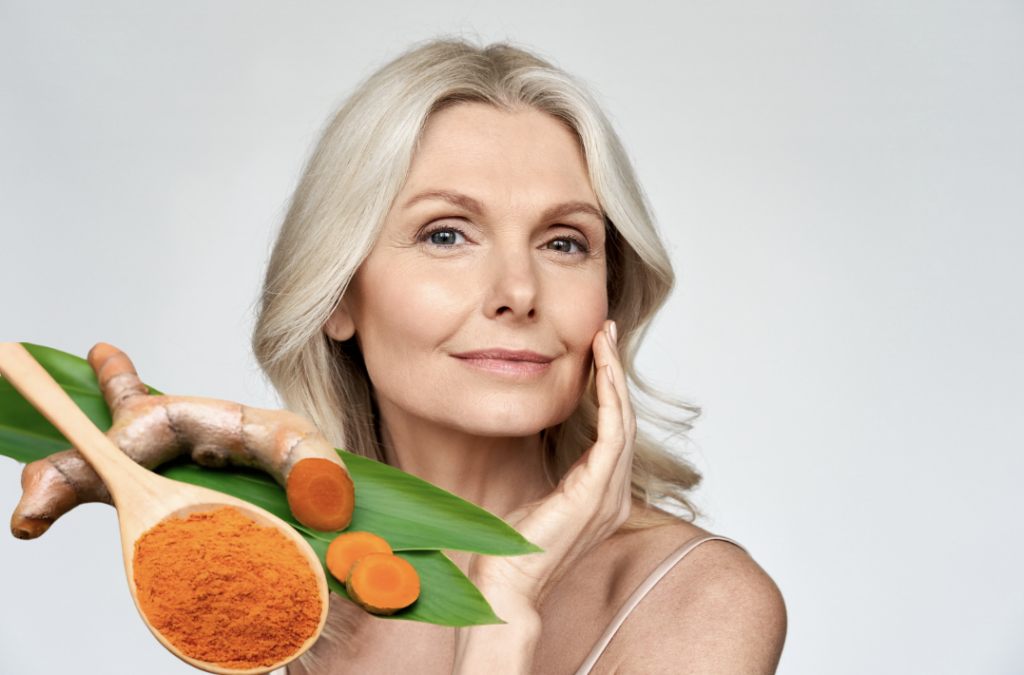Skin Care
Exploring the Anti-Aging Powers of Turmeric
Turmeric, a golden spice with a brilliant color and distinct flavor, has been utilized in traditional medicine for ages. But did you know turmeric could potentially have anti-aging properties? If you’re seeking for a natural strategy to combat the signs of aging, turmeric could be the solution.
Understanding the Aging Process
It is necessary to have an understanding of the aging process before we can proceed with discussing the anti-aging properties of turmeric. We experience a progressive loss of elasticity and firmness in our skin as we get older. There is a possibility that this will lead to the appearance of wrinkles, fine lines, and sagging skin. more skin damage can be caused by environmental factors such as pollution and ultraviolet radiation, which can hasten the aging process and cause more damage to the skin.
The Benefits of Turmeric for Skin Health
In order to investigate the potential health advantages of curcumin, which is a significant component of turmeric, extensive research has been conducted. Curcumin is a powerful antioxidant, which means that it can assist in shielding your skin from the damaging effects of free radicals. Free radicals are molecules that are unstable and have the potential to create harm to skin cells and speed up the aging process. As a result of its ability to neutralize free radicals, curcumin can assist in halting the aging process and maintaining the appearance of youthful skin.

Turmeric as an Anti-Inflammatory Agent
Additionally, turmeric possesses powerful anti-inflammatory properties, in addition to its antioxidant-like properties. Chronic inflammation can hasten the aging process, despite the fact that inflammation is the body’s normal response to damage or infection. Because it contains compounds that have the ability to reduce inflammation throughout the body, including the skin, turmeric is being used. By reducing the amount of redness and irritation that your skin experiences, turmeric can leave it feeling peaceful and healthy.
Turmeric’s Antioxidant Properties and their Effect on Aging
As previously stated, curcumin in turmeric is a potent antioxidant. Antioxidants are chemicals that can prevent or delay the damage produced by free radicals in cells. When it comes to aging, antioxidants are essential for preserving the skin from oxidative stress, which is a primary cause of aging. Curcumin, which neutralizes free radicals, can help prevent the breakdown of collagen and elastin, the proteins responsible for your skin’s structure and elasticity.
How to Use Turmeric for Anti-Aging Purposes
Now that we’ve learned about turmeric and its possible anti-aging benefits, let’s look at how to include it into our beauty routine. One popular way to utilize turmeric is to make a face mask. To make a paste, blend turmeric powder with other natural ingredients such as honey, yogurt, or coconut oil. Place the mask on your face and allow it on for 10-15 minutes before rinsing. This can help to brighten your complexion, reduce inflammation, and enhance overall skin health.
Turmeric can also be incorporated into your diet for added advantages. Turmeric can be added to a variety of meals, including curries, soups, and stir-fries. Consuming turmeric on a regular basis provides your body with a consistent supply of antioxidants and anti-inflammatory substances, which can help prevent aging from the inside out.

Other Health Benefits of Turmeric
Turmeric is not only excellent for anti-aging, but it also has a variety of other health advantages. According to research, turmeric may help reduce the risk of chronic diseases like heart disease, cancer, and Alzheimer’s. It has also been shown to have antidepressant and anti-anxiety properties, making it a possible natural treatment for mental health disorders.
Potential Side Effects and Precautions when Using Turmeric
While turmeric is usually regarded as safe for most individuals, it is critical to be aware of any adverse effects and take appropriate measures. Some people may develop allergic responses or digestive problems after consuming or using turmeric. Furthermore, turmeric may interfere with certain medications, so see a healthcare expert if you have any underlying health concerns or are taking prescriptions.

Incorporating Turmeric into Your Daily Routine
If you’re ready to take advantage of turmeric and its anti-aging properties, here are some recommendations for incorporating it into your daily routine:
- Skincare: Make a turmeric face mask with natural ingredients such as honey, yogurt, and coconut oil. Apply it to your face and let it sit for 10-15 minutes before rinsing.
- Diet: Use turmeric as a spice in curries, soups, and stir-fries. You can also make turmeric tea by heating water with a teaspoon of turmeric powder or grated fresh turmeric.
- Supplements: If you can’t get enough turmeric from your diet, consider taking turmeric pills. For the best results, look for supplements with a regulated dose of curcumin.
Conclusion
While more research is needed to properly grasp turmeric and its anti-aging abilities, the potential is undeniable. Turmeric’s antioxidant and anti-inflammatory effects can help protect your skin, reduce inflammation, and improve the appearance of fine lines and wrinkles. Whether you use turmeric in your skincare routine or in your diet, this golden spice has the potential to be a natural ally in the fight against aging. So why not give it a shot and see for yourself?
In conclusion, turmeric may have anti-aging qualities, making it an important supplement to your skincare and nutrition. Its antioxidant and anti-inflammatory properties can preserve your skin from harm and decrease the appearance of aging. However, it is crucial to remember that turmeric is not a cure-all and should be used in conjunction with a healthy lifestyle and skincare routine. With regular use and adequate care, turmeric can be an effective aid in your quest for youthful, glowing skin.
Trusted Health, Wellness, and Medical advice for your well-being


